Information/Write-up
One of my friends from boarding school came from a family that had made a fortune in the grain business and although they had long since moved to Vancouver, they continued to maintain a summer cottage on one of the many islands that dot the Lake of the Woods, a few hours drive from their former home of Winnipeg. Of course it wasn’t really a cottage at all, as the main house boasted a living room that was 90 feet by 60, with a 35 foot tall cathedral ceiling all anchored by a massive stone fireplace that had a hearth so big you could have parked a small car in it. Some cottage, indeed. Travelling from the west, Lake of the Woods is the first significant example of “Cottage Country” as its known throughout the east. It is a way of life for many folks in Toronto and Montreal and the other eastern cities, and provides urban dwellers with a chance to feel a little bit closer to nature. The Canadian shield which stretches across Ontario and Quebec is dotted with lakes and of course the Great Lakes themselves are home to many a cottage, some grand beyond belief and others that are little more than basic shelter. Gord’s place was set on one half of an island and comprised something like 10 acres, but it seemed bigger because of the rocky coves and twisted shoreline. Unique to the vicinity, there was also a large sandy halfmoon beach on the south side of the property. The usual approach though was via the boathouse and dock on the north side. From there a trail led up the camp on the right, while to the left sprawled a lawn tennis court. There was also the remains of what had once been a pretty decent nine hole golf course – still playable if you don’t mind the rough. The house had been built in the 1920’s in a grand style of rustic splendor and while in need of some spit and polish, it retained an aura of gracious exclusivity.
Gord’s family had been rather sporadic in their collective use of the place but he was an enthusiastic booster of its special character and so he decided to spend the summer there one year in the late 70’s, when we would have been in our early twenties. Since I didn’t have anything better going on, I tagged along for the ride. It was an experience I learnt a lot from, and I have to say that living on an island in luxurious surroundings is pretty seductive. Of course, in contrast to earlier years when the establishment had been staffed by cooks, maids and groundskeepers, there was no longer any staff and even the grand boat house which had once sheltered a large ChrisCraft yacht and several other powerboats, canoes and sailboats and even sleeping accommodations for some of the staff had since been stripped back to a utilitarian dock with a flat roof, whose lone inhabitant besides a few nests of raucous birds known as grackles, was a battered and pedestrian Hourston Glascraft runabout. To our eyes, however, the island camp was a paradise of rare beauty, and we had a wonderful time alternating between maintenance projects and sheer indolence. Living on an island, visits to the nearby town of Kenora necessitated travel by boat and who could resist the charms of a town where the local Safeway included temporary moorage for a dozen or so boats on one side of the parking lot? Kenora was also infamous for its not-so-charming side; home to seedy bars and public displays of drunken and lewd behaviour. Naturally, it was going to be easy for us to fit in.
One evening, tired and bored of holing up on the island, we fired up the runabout and set off through Devil’s Gap for town. We tied up at the municipal dock and set off for one of the local dives, where there was the promise of some live music and cheap beer. The place rapidly filled up and we quickly got into the rhythm of drinking and dancing and meeting the locals, both the “townies” and the more seasonal island residents. The entertainment that evening was someone named Doc Tibbles, who played a little bit of country, a little bit of folk and a little bit of blues, finger picking on a battered acoustic guitar. Obviously a crowd favorite, his playlist a known quantity, the suds were flowing copiously that night. Eventually the house lights came up and the bar shut down and we stumbled off into the night. As we made our way back to the boat it became increasingly obvious that more than a few of our recent acquaintances were heading in a similar direction. As it turned out, two houseboats were tied up at the dock and were waiting to be transformed into an aquatic party central. The majority of the crowd from the bar clambered aboard, the houseboats were lashed together and a small flotilla of smaller boats, ours included, were tied on behind. There are some parties that are destined to live on in memory, and this was one, regardless of the mental capacity of your faithful correspondent who continued to imbibe freely over the course of the next several hours. This was one of the best.
Tibbles had come along for the party, and after a few drinks and tokes he started playing again. This caused a general migration in his direction, which in turn resulted in a serious list to the houseboats. After some frantic moments, the optimal location was found for Doc, and of course the audience, and we stopped taking on water and the starboard pontoon settled back into the water where it was supposed to be. All of us were having a grand old time, including Captain Jack, owner and pilot of the lead houseboat. I had been chatting to him as he stood at the wheel, navigating the murky darkness and avoiding the thousands of islands in the lake. Eventually the beer caught up to him, and he asked me to take the wheel while he headed off to the stern to answer nature’s call. “Don’t worry, I’ll be right back” he said as he wandered off. At first it was kind of fun and I felt kind of special holding onto the wheel, but then I realized just how dark it was and that I had no idea of where we were on the lake, or how close we might be to reefs and rocks and other hazards. The minutes stretched on and Cap’n Jack remained nowhere in sight. After coming a little closer to sobriety as the adrenalin kicked in, I eventually managed to talk somebody local into taking the helm, and went off in search of Jack who had, in fact, passed out on deck! I managed to get Jack up, albeit not exactly steady, and dragged him over to the small cabin on the upper deck where he tumbled into the bunk.
After that interlude, I was able to enjoy the rest of the cruise listening to Doc as he played song after song, bantered with the crowd, most of whom he seemed to know quite well, and generally kept everyone interested in staying awake. As dawn lifted the veil of darkness from the lake, those of us with motorboats hauled on the lines, scrambled aboard, and cast off. That was my introduction to Doc Tibbles, one of the more memorable musicians I’ve had the pleasure of getting to know on life’s journey.
Doc was born Terry Erickson, in what is now Thunder Bay, but was once two separate communities known as Fort William and Port Arthur. He grew up musically inclined, quickly getting a handle on the guitar and then learning the banjo and the bass. In 1964, Doc hooked up with Neil Young and became a member of the Squires, playing both bass and guitar. (Doc and Neil’s adventures during this period are outlined in John Einarson’s book, “Neil Young: The Canadian Years”.) In early ’65 they met Stephen Stills who was in a band called The Company at a club in Port Arthur but, later that year, the Squires broke up and Doc and Neil parted company in Toronto. Never achieving anywhere near the commercial success of his former bandmate, Doc nonetheless carved out a career playing folk festivals and the bars and clubs of northern Ontario and the Winnipeg region.
Amongst others, Doc has made stage appearances with: Neil Young, Sneezy Waters, John Allen Cameron, Big Joe Dustin, Stefan Grossman, Amos Garret, Gerry & the Pacemakers, Dan Casavant, Lighthouse, Guy van Duser, Big Dave McLean, John Hammond, Ken Hamm, Jim Post, Eric Nagler, Darcy Deaville, MacLean And MacLean, Eric Thompson, Gene Vincent, Cathy Fink, Duck Donald, Bill Garret, Norman Blake, David Essig, Dakota Dave Hill, Curly Boy Stubbs, Tom Jackson, Hound Dog, Kansas City Kramer, Wayne Faulconer, Pat Brett, and Leo Kottke.
Kenora hosted an annual Lake of the Woods Folk Festival and one year, not long after we had met Doc, Gord came up with a brilliant idea for getting free passes to the event. He got Doc to put him in touch with the festival’s organizers and it was soon arranged that about a dozen of the top acts would be put up at Gord’s camp. We set to work dusting off the mothballed bedrooms and checking that the plumbing worked in the various bathrooms. We discovered that there were in fact 26 beds in the place, since the main cottage was large and designed for parties and also because the camp included a three bedroom winterized house (where we had set ourselves up) and a small log cabin overlooking a hidden cove where Gord’s parents usually stayed while in residence. After working feverishly for a few days, the lawns were mowed, trails swept, floors vacuumed, and everything was polished that needed it. The camp had regained something of its former glory and was ready for action. Soon boats started arriving at the dock, full of musicians. For that incredible weekend the place was magical; beautiful ladies playing dulcimers and violins amongst the silver birches, haunting ballads sung on the sandy beach as gentle waves lapped at the shore, jam sessions in the main house that morphed and regrouped depending on the players but that went on more or less without interruption for the whole time. And while it was indeed a magical weekend it quickly became apparent that those free passes weren’t free at all, as Gord and I and a bunch of our local friends were all pressed into service as the unofficial “staff” of the instant resort, cleaning up, lifting and toting, preparing meals, and acting as bartenders. As it turned out I saw precious little of the actual folk festival itself but was more than happy to be a fly on the wall backstage and to be part of the unofficial festival that took place back at the cottage. It sure gave me an appreciation of the logistics that go into even relatively minor events and the number of people required to get those lone singers up on stage with a single spot shining down on them. The shadows are pretty crowded!
Anyway, Gord and Doc and myself became pretty good friends over those summers, and for some years thereafter hanging out at Gord’s cottage sharing bottles of whiskey, contraband herbs and of course listening to Doc play and sing. Doc loved to make music and would play for hours at a time, with or without an audience. One summer we returned to discover that Doc had upgraded the battered old guitar with a gorgeous handcrafted Larrivee, with silver frets, mother of pearl inlay and a great tone. He had also recorded a self-titled album and the Mingulay Boat Song, one of the cuts that featured his friend Pat Brett, was getting a lot of airplay in Kenora and other regional centres. Pat was an Irishman, who seemed to be a little guarded about his past, which perhaps was only to be expected given the Troubles that had been rocking the old sod. I always had the impression that a gang of Orangemen or the IRA or the Sinn Fein were going to jump out of the bushes one day and give him whatever he might have had coming. Anyway he knew countless Irish ballads and was a pretty prolific songwriter himself so between the two of them, everyone within earshot had a steady stream of great music filling the aural landscape. Pat fit right in with the rest of the crowd and added a nice counterpoint to Doc, on stage as well as in life. Being friends with Doc also gave us access to all his local friends and connections, which also made life there a lot more interesting and comfortable. This included being directed to a mechanic who had reportedly worked for Carroll Shelby. Gord’s Celica had been “tweaked” and was pretty high performance already but it had been running poorly. I’m not sure if the guy had actually been part of the Shelby team, but the long drive down the back roads was well worth it, as the car never ran better than after that tune-up.
At some point, we were interrogating Doc about how many musical instruments he could play. “Guitar, bass, banjo, piano are the basics I guess”, opined Tibbles. “Then there’s been the occasional attempt to play the fiddle, or the dulcimer, and I’ve even been known to play drums on occasion. Some trumpet, a little trombone, and I can coax a sound out of a saxophone. How’s that?” “Wow, that’s awesome”, I replied. “What’s your favorite thing to play?” “I’m glad you asked me that Dave,” he said with a straight face. “What’s my favorite thing to play? Around!” Everyone in earshot erupted in laughter. It took me a second or two to get it.
Thinking about all those instruments got Doc thinking and after the chuckles subsided, he said, “There is another instrument called a dobro that I used to play. Not for years though. I lent it to Neil and I haven’t seen him for years.” Naturally that led to a number of Neil Young stories like driving around in the hearse that Neil owned back then. He had bought it figuring it would be good for hauling equipment such as all the amps, guitars, drum kits, mikes, cables and stands that you need in a band. It also was a good highway cruiser and they would tear along in the dark across northern Ontario, like some kind of demented harbinger of doom based on the looks they got from other cars on the road.
Gord was taking all this in with a lot of interest since he had always liked Neil Young and he just loved to hang out with the rich and famous. (Is that wrong? Course not.) A while later Gord came into a trust fund or some other windfall and got in touch with Doc. Without further ado, Gord and Doc were soon en route to Hawaii to recover Doc’s dobro. They ended up spending the better part of two weeks hanging out with Neil on his Hawaiian ranch. Indeed Doc recovered his dobro from Neil, which had been used on many of those landmark records of the previous decade and a half. And Gord was pretty pleased too, getting to hang out with a rock icon.
One of the annual events during those years was the Smoke‘n Fish Derby. It took place on Scotty’s Island, which was actually a municipal park that the Town of Kenora had acquired quite a few miles out of town. The basic premise of the derby was that all the long hairs and hippies and general hosers in the vicinity would have a wild weekend at the park and the person that caught the largest pickerel that weekend would win a pound of pot.
This concept did not sit well with the three jurisdictions of law enforcement in the area: the RCMP, the Ontario Provincial Police, and the municipal police force. They didn’t attempt to stop the party or even set foot on the island during the proceedings but they did try to stop any boats heading there to check for anything illegal or suspicious. As a result it had become quite a sport figuring out ways to avoid the cordon of police boats. Some folks would go to the island days or weeks ahead of time and plant their stashes in hidden locations, while others made do with tactics like waterskiing in with waterproof bags, and some even parachuted in. People arrived with tents, every houseboat on the lake was pressed into service, and the beer stores were cleaned out for miles around. A stage was set up and a generator was barged to the island and local bands would play for free. From what I recall, the fishing aspect was a minor sidelight to this Woodstock on the lake but boy, did they ever know how to party!
Doc took to travelling out west from time to time. On one occasion a number of us spent a few days on the remote Nahatlatch River to get a break from the city. Doc and I were out canoeing and we had the misfortune of capsizing. Nothing serious and we easily righted the canoe and resumed paddling but Doc had been wearing leather pants. He ended up having to wear the sodden things all day, allowing them to dry naturally so that they’d still fit, since he said this had happened once before and they had shrunk so considerably he had to get rid of them. But throughout it all he laughed and smiled. At one point in the 80’s Doc headed south to Mexico’s Pacific coast, where he remained for a couple of years, living in a beachfront hut. Coming from north Ontario, Doc was a good fisherman, so he would fish in the mornings, sell his catch, and then play guitar in the evenings at one of the local bars. Eventually he got a little too tangled up in amorous intrigues and returned to Canada, with a few songs and a lot of memories. He cut a second album, Unattached Tunes, which includes a few of those. Doc caught a dose of the travel bug and spent time in Europe and Japan among other places over the next several years. Gord moved away to Toronto and then to Winnipeg and I got married and settled down in Victoria and we all just fell out of touch. A couple of years ago I went on one of those legendary cross-country road trips with my daughters and we happened to be having lunch at a roadside diner in northern Ontario when I realized that the booth next to us was occupied by musicians. I leaned over and asked them if they happened to know Doc Tibbles. “Of course, he’s a legend around here!” came the quick reply. In fact he had a new CD out called House Calls. He was still playing and living mostly in Thunder Bay and making music. I hope he will continue to do so for years to come.
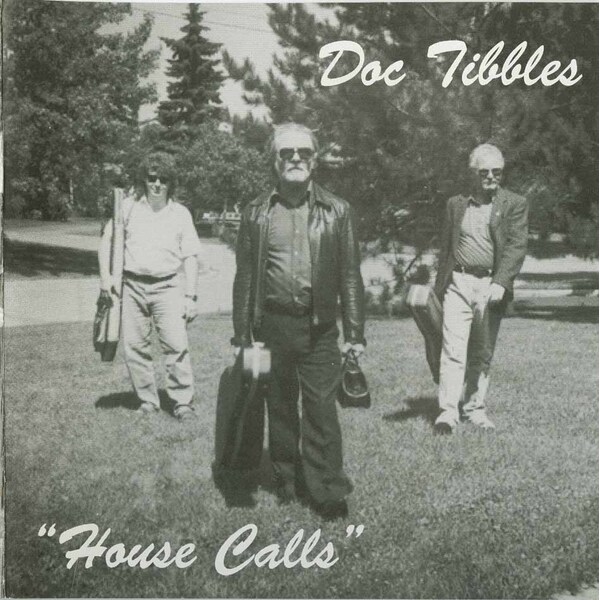
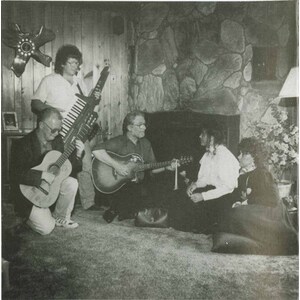
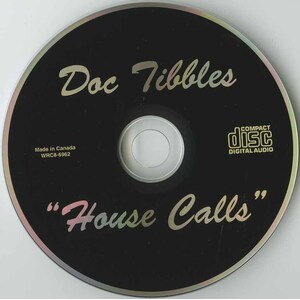
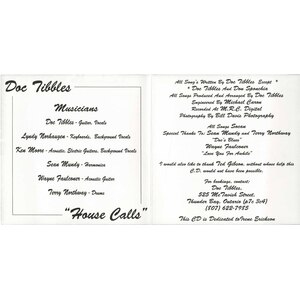
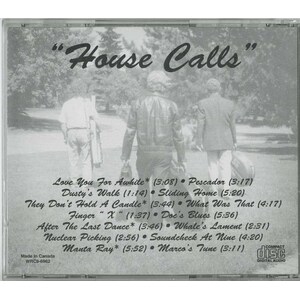
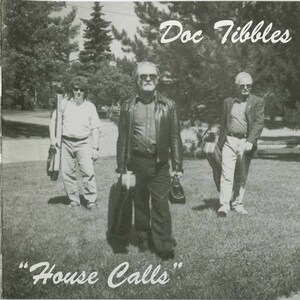
No Comments